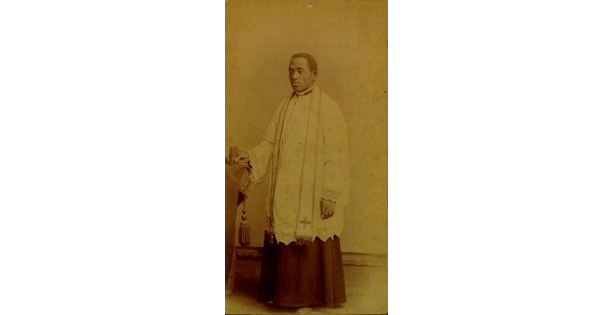Augustine was born in Missouri to Peter Paul Tolton and Martha Jane Chisley in the year 1854.They were slaves of a white man named Stephen Elliott who suffered under the delusion that men, women, and children could be held in bondage simply because of the color of their skin. Perhaps Stephen rationalized that the men in charge had made the decision and it wasn’t his place to rebel against the status quo but, ultimately, he was a part of the problem if for no other reason than his refusal to be a part of the solution. All of this meant that their four children–Charles, Augustine, Cordella, and Anna–were born into the slavery that held their parents captive. The Elliot family was Roman Catholic and insisted upon all of their slaves being baptized into the faith of their choosing. Peter Paul and Martha Jane had developed a faith of their own in a Lord who promised liberation to those held captive and life to those who dwelt with death. Their children were raised in this faith and began to claim it as their own long before Peter Paul escaped slavery to help put an end to the heinous institution. Peter Paul joined the Union army at the beginning of Civil War and served as best he knew how to put an end to the system that so many others refused even to acknowledge as problematic. Peter Paul died in some battle now lost to the fog of history.
Martha Jane and her children–including Augustine–soon fled the land where they were enslaved and forced to work. Taking advantage of the uproar that gripped their area, they slipped away from the farm at night and began travelling for the”free state” of Illinois. When they crossed the Mississippi river she told her children never to forget the day that they had gained their freedom and, more importantly, never to forget the goodness of God to lead them out of bondage. Augustine, his mother, and siblings went to work in a cigar factory but after the death of his older brother Charles it became clear that he would need to find a better and safer life if he was going to help take care of his mother and sisters.The priest in the church they attended–Peter McGirr–took a liking to Augustine and decided to take a stand on his behalf: he admitted Augustine to the parochial school of St. Peter’s Roman Catholic church. This caused an uproar among even those who had fought against slavery–they were comfortable with freeing slaves but not freely offering equal opportunities to ex-slaves. Father McGirr was constantly berated and criticized for this decision and it indubitably cost him much of his credibility in the community but he was not willing to be complicit in a system that dehumanized ex-slaves.
Augustine received an excellent education and professed a calling to become a priest like the man who had given him a chance at a better life. He applied to seminaries throughout the United States and was rejected from each and every one. So, instead, Father McGirr talked to those he knew in Rome about Augustine received his education at the Pontifical Urbaniana University. He was admitted and received the training he needed to enter the priesthood. He became fluent in Italian, Latin, and Greek and, finally, was ordained to the priesthood in Rome in the year 1886. He returned to the United States where he tried to establish a parish in Quincy, Illinois, but he was resisted heavily by both the white and the black residents of the town. He stood in the middle and insisted that both black and white citizens were welcome in the church even as both sides insisted that the other should be outcast.Eventually, he was transferred to Chicago where he was able to establish a parish church that had over 600 parishioners. In this place they welcomed people of any color and nationality in a hope to banish the status quo of the past from the minds of men and women set free from the evils of slavery. When Augustine died in 1897 his body was taken back to Quincy and buried in the priest’s cemetery next to St. Peter’s Roman Catholic church where his new life had begun in the ashes of slavery left behind.
Read more from Joshua Hearne at his personal website and the website of Grace and Main Fellowship, the non-traditional community he ministers with.


Follow Us!